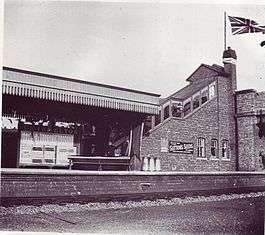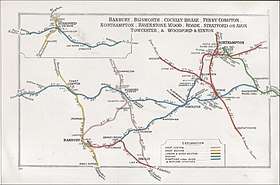Charwelton railway station
Charwelton railway station was a station at Charwelton in Northamptonshire on the former Great Central Railway main line,[1] the last main line to be built from the Northern England to London. The station opened with the line on 15 March 1899.
| Charwelton | |
|---|---|
 Charwelton station in 1909 during a visit by the Royal Train | |
| Location | |
| Place | Charwelton |
| Area | Daventry |
| Grid reference | SP536560 |
| Operations | |
| Original company | Great Central Railway |
| Pre-grouping | Great Central Railway |
| Post-grouping | London and North Eastern Railway London Midland Region of British Railways |
| Platforms | 2 |
| History | |
| 15 March 1899 | Opened |
| 1917 | ironstone railway opened |
| 1961 | ironstone railway closed |
| 4 March 1963 | Closed |
| Disused railway stations in the United Kingdom | |
| Closed railway stations in Britain A B C D–F G H–J K–L M–O P–R S T–V W–Z | |
Location and opening
The station was one of the standard island platform design typical of the London Extension, and here it was the more common "cutting" type reached from a roadway (the Banbury to Daventry road, now classified A361, formerly the B4036), that crossed the line.[2] Just to the south were Charwelton Watertroughs, while to the north is the 2,997-yard (2.7 km) Catesby Tunnel.[3]
Royal visit
In May 1905 the Duchess of Albany visited her lady-in-waiting, Lady Knightley, at Fawsley Hall.[4] The princess travelled by rail to Charwelton station, where the children of Charwelton were turned out in their best clothes and waving union flags to welcome her.[4]
Ironstone railway
In 1917 the Park Gate Iron and Steel Company, based at Parkgate near Rotherham, South Yorkshire, opened an ironstone quarry 0.5 miles (800 m) south of the nearby village of Hellidon, and had a 1.5-mile (2 km) standard gauge mineral railway built to bring the stone to the main line.[5]
Quarrying ceased in June 1933 but the Ministry of Supply ordered its resumption in May 1941. It ceased again in October 1945, but was resumed yet again in May 1951. At its peak Charwelton goods yard was busy with up to 200 wagons stabled in its sidings at any one time.[2] As late as 1961 a new quarry was opened at Hellidon, but this proved less successful and so both quarry and line closed on 18 November that same year, the branch being dismantled in June 1963 and the sidings at Charwelton following in 1964.[6][7]
A steam locomotive called Charwelton was built for the line in 1917, worked it until 1942, and is now preserved on the Kent and East Sussex Railway.[8]
Closure
Charwelton station closed to passengers and goods on 4 March 1963, the line itself on 5 September 1966.[2] The station buildings had already gone before the line closed, though the platform remained until the mid-1980s as so – more critically – did the road bridge. This became something of a traffic hazard owing to its steep approaches, a sharp kink in the road at the apex on the west side, and poor visibility. In 1985 the bridge was demolished and the road straightened and lowered. The platform was removed at the same time. The road now cuts across the site of the platform roughly level with the "Charwelton" name-sign in the 1909 photograph above right.
Route

| Preceding station | Disused railways | Following station | ||
|---|---|---|---|---|
| Woodford Halse Line and station closed |
Great Central Railway London Extension |
Braunston and Willoughby Line and station closed |
See also
- The Reshaping of British Railways
Notes
- Conolly 1976, p. 10, section B4
- Catford 2008
- "page 1". Railway Tunnel Lengths website. Phil Deaves. 28 January 1929. Retrieved 31 October 2013.
- Boyd-Hope, Sargent & Newton 2007, pp. 92–93
- "New Popular Edition Maps". Retrieved 31 October 2013.
- Tonks 1988, pp. 124–136
- Christensen 1993, Charwelton Ironstone
- "No. 14 Charwelton". Steam Locomotives. Kent and East Sussex Railway. Archived from the original on 29 October 2013. Retrieved 27 October 2013.
References
- Boyd-Hope, Gary; Sargent, Andrew; Newton, Sydney (2007). Railways and Rural Life: S W A Newton and the Great Central Railway. Swindon: English Heritage and Leicestershire County Council. pp. 92–93. ISBN 978-185074-959-2.CS1 maint: ref=harv (link)
- Catford, Nick (14 December 2008). "SB-Sites:Charwelton Station". Subterranea Britannica. Retrieved 8 November 2009.CS1 maint: ref=harv (link)
- Christensen, Mike (Summer 1993). Karau, Paul; Beale, Gerry (eds.). "Charwelton Ironstone". British Railway Journal. Didcot: Wild Swan. 5 (47): 334–342. Retrieved 8 November 2009.CS1 maint: ref=harv (link)
- British Railways Pre-Grouping Atlas and Gazetteer (Map) (5th ed.). 1" = 8 miles. Cartography by W. Philip Conolly. Ian Allan. 1976. ISBN 0-7110-0320-3.
- Tonks, Eric S. (October 1968). "Ironstone Tramways of the Midlands (7) Byfield & Charwelton". The Industrial Railway Record. The Industrial Railway Society. 2 (21): 317–319/324–328. Retrieved 8 November 2009.CS1 maint: ref=harv (link)
- Tonks, Eric (April 1988). The Ironstone Quarries of the Midlands Part 2: The Oxfordshire Field. Cheltenham: Runpast Publishing. ISBN 1-870-754-026.